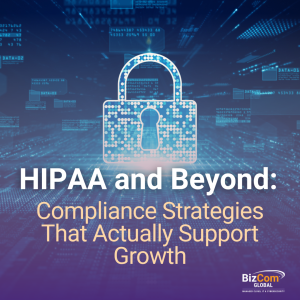
Compliance is often seen as a cost center — but when done right, it can actually open doors to new markets and reduce risk exposure.
For many business leaders, the word “compliance” triggers a familiar reaction: paperwork, legal risk, and sunk costs. But what if we flipped the script?
When handled strategically, data privacy and cybersecurity compliance — including frameworks like HIPAA, PCI DSS, and FTC Safeguards — don’t just protect your business. They position you for growth, build trust with clients, and create operational clarity.
This isn’t just about avoiding fines. It’s about unlocking opportunities.
Compliance Isn’t Just About the Healthcare Sector Anymore
Yes, HIPAA still applies most obviously to covered entities like medical practices, hospitals, and insurance companies. But if you serve any of those organizations — even indirectly — you’re probably required to comply as a Business Associate.
That means your marketing firm, IT provider, app developer, or billing company may need to meet strict privacy and security standards. And if you want to win or keep those contracts, you’ll need to show you’re not a liability.
Beyond HIPAA, other standards like PCI DSS (for businesses handling credit cards) or FTC Safeguards (for those collecting personal financial info) are expanding in scope — and enforcement.
Where Most Businesses Go Wrong
The mistake many organizations make is treating compliance like a one-off audit or a set of documents to file away. In reality, true compliance is ongoing — and it’s cultural.
When leadership sees it as just a cost or obligation, employees often do the bare minimum. But when it’s positioned as part of your brand promise, it becomes a differentiator.
How Compliance Can Drive Growth
Here’s how forward-thinking leaders are turning compliance into a strategic asset:
- Qualify for Bigger Contracts
Clients in healthcare, finance, education, and government often require vendors to prove compliance. Meeting these standards expands your potential customer base.
- Strengthen Client Trust
Security is no longer invisible. Clients ask how you protect their data — and being able to answer with confidence builds trust that drives retention.
- Streamline Operations
Compliance pushes businesses to clean up inefficiencies — from how data is stored, to who has access, to how systems talk to each other.
- Lower Insurance Costs & Risk
Cyber insurance providers are increasingly requiring documentation of compliance. Meet those standards, and you’re less likely to be denied a claim — or hit with higher premiums.
Getting Started: Compliance as a Strategic Conversation
So what does a business-minded approach to compliance look like?
- Conduct a Risk Analysis
Identify where your current practices fall short of compliance expectations — and prioritize risks by impact, not just technical depth.
- Build Compliance Into Your Culture
Train employees. Create repeatable processes. Align your vendors and systems. It’s not about doing everything — it’s about doing the right things consistently.
- Track and Document Everything
Regulators — and enterprise clients — want to see not just what you’re doing, but how you’re verifying it. Documented policies, access logs, and training records are all part of that puzzle.
- Tie It to Business Goals
Want to serve larger clients? Bid on government contracts? Partner with a healthcare organization? Compliance can be your golden ticket — if you approach it with intention.
Final Thought: Compliance Isn’t Just Protection — It’s Positioning
If your competitors are still seeing compliance as an expense, this is your moment to move ahead. A proactive, clear approach to data privacy and security tells your market:
We’re serious. We’re capable. We’re trustworthy.
And that’s something worth investing in.
Want to turn compliance into a competitive edge?
Book a 5 Pillar Business IT Risk Assessment with BizCom Global and let’s map a strategy that protects your business and positions it for growth.



